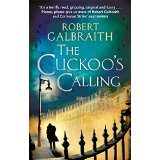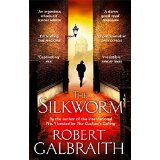What a find! Not only is the novel an engaging audio page-turner of a thriller, it is read by the talented character actor Robert Glenister. His interpretation gives the central character Cameron Strike, an SIB investigator who is an amputee with a craggy character and a west country accent, credibility, humanity and an appeal with which this reader certainly connected
I have now had all three novels read to me by Glenister. One after the other with no restraint, no 'cooling-off' period in between each book in which to digest the plot of the one and anticipate the pleasure of the next story-telling session, but headlong to the exclusion of all other listening media. Fortunate that I had embarked on some time-consuming jobs which included a re-shelving of my fiction library. And a bit of tidying up. With my iPhone tucked in my pocket I can enjoy a supreme reading experience to accompany a manual task.
'Galbraith' has found many fans for her crime novels and a stream of adjectives describe her thrillers: gripping, compelling, addictive (yes certainly that!), cleverly plotted, atmospheric, entertaining..... a bit tame that last one.
 So here's the first in the series, The Cuckoo's Calling, and let's hope she at the very least keeps to her promise to write seven in the series.. A troubled model falls to her death from a snow-covered Mayfair balcony and it is assumed that she has committed suicide. However, her brother has his doubts, and calls in private investigator Cormoran Strike to look into the case. Strike is a war veteran - wounded both physically and psychologically - and his life is in disarray. The case gives him a financial lifeline, but it comes at a personal cost: the more he delves into the young model's complex world, the darker and more dangerous things become. The action takes place in London and Galbraith captures the atmosphere of both smart West End and backstreet settings.
So here's the first in the series, The Cuckoo's Calling, and let's hope she at the very least keeps to her promise to write seven in the series.. A troubled model falls to her death from a snow-covered Mayfair balcony and it is assumed that she has committed suicide. However, her brother has his doubts, and calls in private investigator Cormoran Strike to look into the case. Strike is a war veteran - wounded both physically and psychologically - and his life is in disarray. The case gives him a financial lifeline, but it comes at a personal cost: the more he delves into the young model's complex world, the darker and more dangerous things become. The action takes place in London and Galbraith captures the atmosphere of both smart West End and backstreet settings.  The second novel, The Silkworm, shifts to territory which is very familiar to JKR. A novelist, Owen Quine, has just completed a manuscript featuring poisonous pen-portraits of almost everyone he knows. If the novel were to be published it would ruin lives - so there are a lot of people who might want to silence him. As the investigation proceeds it is clear that there is more to the novelist's disappearance than a straightforward leave of absence. When Quine is found brutally murdered in bizarre circumstances, it becomes a race against time to understand the motivation of a ruthless killer. In this second novel JKR develops the professional relationship between Cormoran Strike and his secretary Robin Ellacott.
The second novel, The Silkworm, shifts to territory which is very familiar to JKR. A novelist, Owen Quine, has just completed a manuscript featuring poisonous pen-portraits of almost everyone he knows. If the novel were to be published it would ruin lives - so there are a lot of people who might want to silence him. As the investigation proceeds it is clear that there is more to the novelist's disappearance than a straightforward leave of absence. When Quine is found brutally murdered in bizarre circumstances, it becomes a race against time to understand the motivation of a ruthless killer. In this second novel JKR develops the professional relationship between Cormoran Strike and his secretary Robin Ellacott.In the third novel some clever plotting with unexpected twists and red herrings results in a dark tale of a serial killer driven by a grudge against Cormoran, to discredit and taunt the detective and bring about the ruination of the private investigation business Strike is trying to establish.
Woven into the principle narrative is the story of Strike and Robin Ellacott who are at crossroads in their professional and personal lives. I found it difficult to switch this audiobook off... a combination of the gripping and fast-paced plot and the fluent and compelling narration by Robert Glenister provides an enthralling listening experience. The range of accents he uses for a cast of shady characters and gruff policemen is skilful indeed. I really enjoy the voice he has chosen for the wide boy Shanker. All in all I cannot wait for these novels to be brought to the screen. Nor can I wait to find out which man wins out on Robin's wedding day............. but I'm hoping.



